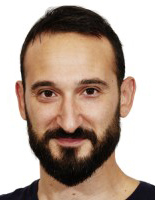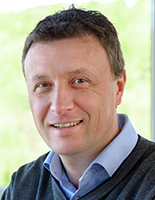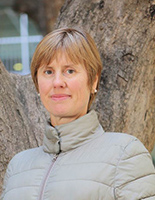Pandemic responses from alumni

At this challenging and unprecedented time, EMBL is proud that members throughout its community are finding creative and impactful ways to support global efforts to tackle the COVID-19 pandemic. Here, alumni describe what they’ve been doing to aid research efforts and government responses where they are.
Have you taken action to combat the virus? Please let us know with a short description, profile photo and relevant URL if you have one.
Find out more about EMBL’s response to the novel coronavirus outbreak here.

Ishaan Gupta
Postdoc, EMBL Heidelberg, 2010-2015
Assistant Professor, Indian Institute of Technology (IIT), New Delhi
“We are looking to decipher the cell-type specificity of the COVID-19 infection and the impact of human genetics on viral interactivity. In our first approach, by performing integrative multi-omic analysis across various molecular biology based assays such as viral-interactome capture (pioneered by Alfredo Costello at the Hentze group) and single-cell transcriptomics, we found dramatic changes in the molecular signatures of specific Monocytic populations and vascular cells from published COVID -19 patient datasets. Recently, with the help of fellow EMBL alumni Vicente Pelechano, Simon Anders, and Michael Knop, we are trying to scale up our testing efforts by incorporating the LAMP assay developed by them.” (14 May 2020) Read more

Keith Stanley
Staff Scientist and Group Leader, EMBL Heidelberg, 1980-1989
Managing Director, AusDiagnostics Pty Ltd, Australia
“As soon as the first sequence of SARS-CoV-2 was published we developed a test for our diagnostic systems and had a product tested on clinical samples by 31st January 2020. We are now manufacturing about 200,000 tests per month in Sydney and 100,000 tests per month in London, working closely with health authorities and public hospitals. Our test is more sensitive that the reference tests used in WHO labs so particularly useful to detect the virus in asymptomatic patients.” (28 April 2020)

Angelo Raggioli
Postdoc, EMBL Rome, 2014-2019
Head of Vectorology, Reithera, Rome, Italy
“At Reithera we are developing a vaccine against SARS-CoV2, named GRAd-COV2, using an adenovirus-based platform similar to the one that proved successful in 2014 during the Ebola outbreak in Africa. The GRAd-COV2 vaccine leverages on the knowledge and expertise acquired, among others, by former EMBL members Riccardo Cortese, Alfredo Nicosia and Alessandra Vitelli, to design, engineer and manufacture adenoviral vector-based vaccines. The vaccine against the novel Coronavirus should hit clinical trials phase-I/II starting July 2020. We are definitely thrilled by the opportunity to make available our know-how to find a solution to get out of this threatening pandemic.” (22 April 2020)

Mariano Maffei
Postdoc, EMBL Rome, 2015-2019
Senior Scientist, Takis Biotech, Rome, Italy
“As soon as the first COVID-19 cases were recorded at the end of January in China, our biotech decided to work on the development of a vaccine. I immediately wanted to participate in this challenge since I believe that we, as scientists, have a great responsibility and we must put efforts into the fight. Practically, I was involved in the experimental design of some of the candidates that are currently tested in pre-clinical studies. I hope this can really help the whole community.” (22 April 2020)

Xiushan Yin
Postdoc, EMBL Heidelberg, 2009-2010
Karolinska Institutet, Solna, Sweden
“Vicente Pelechano, Weihua Chen, and I (all EMBL alumni) are helping Africa, Pakistan, Israel and other countries with test methods and kits. Our company also donated RT-qPCR kits covering more than 20,000 people, and we will continue working with NGOs to provide donations and free technical support. If other countries emergently need this kind of help, we would be happy to provide it. Maybe through the alumni group we can expand the EMBL alliance against COVID-19.” (25 March 2020) Read more and watch a Swedish TV report on their work.

Patrick Cramer
Predoc, EMBL Grenoble, 1995-1998
Director, Max Planck Institute for Biophysical Chemistry, Göttingen, Germany
“Each morning at 8am I send an email to the entire group with an encouraging, philosophical quote of a person who may serve as a role model; someone to look up to. I hope this email helps everyone to feel connected to the group during our time in home office, but also to motivate people and to stimulate creativity and thinking outside the box”. (8 April 2020)

Fatima Gebauer
Postdoc, EMBL Heidelberg, 1996-2000
Group Leader, CRG, Barcelona, Spain
“The CRG is doing SARS-CoV2 tests for the citizens of Barcelona, has donated kits and other necessary materials (coats, gloves, masks) to hospitals, and has offered trained manpower to local and national authorities. We have a Crisis Committee that deals with all COVID-derived issues relevant for our community and beyond, which operates “on the minute”, where EMBL alumni participate.” (11 April 2020) Read more

Angus Lamond
Group Leader and Senior Scientist, EMBL Heidelberg, 1987-1995
Professor of Biochemistry, University Dundee, UK
“I received a phone call from 10 Downing Street as the UK government was busy setting up an emergency national virus testing lab. They decided to approach university research labs and ask if researchers were willing to donate equipment needed to operate the testing lab to save time. I have two liquid-handling robots in my lab, which were described as being ‘like gold dust’. We use them for sample prep for Mass Spectrometry, but they can also be used to automate sample prep for PCR assays. Of course I agreed to give them to the government, so I packed them up and met a team from the Royal Navy who were sent to collect my equipment and rush it to the new facility near London. Fingers crossed it may help a little. They believed with the donation of key equipment for PCR reactions and liquid handling etc, they could immediately increase numbers of tests being done in the UK by ~10X.” (22 March 2020)